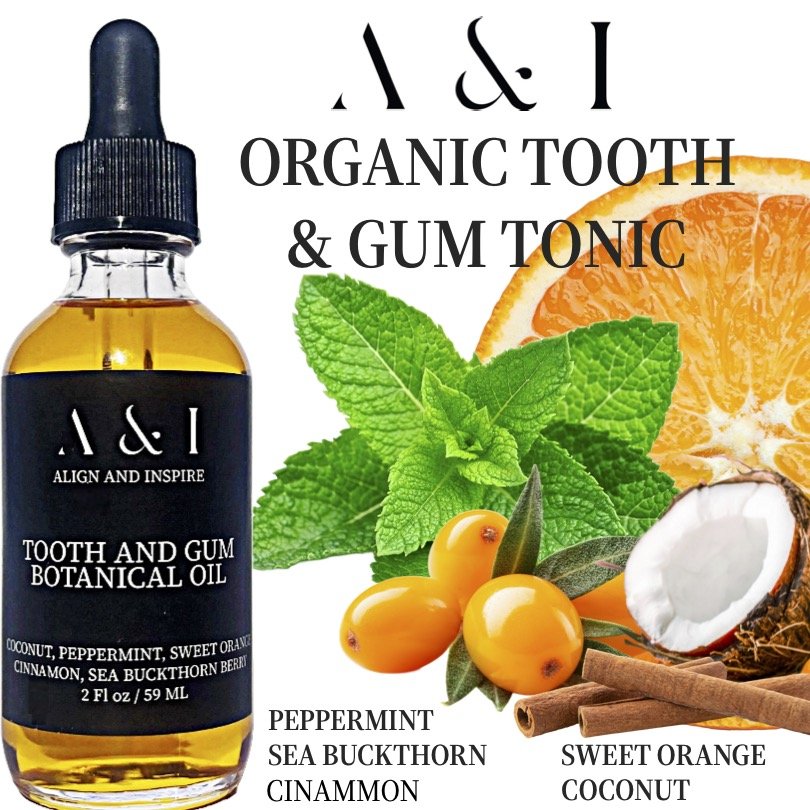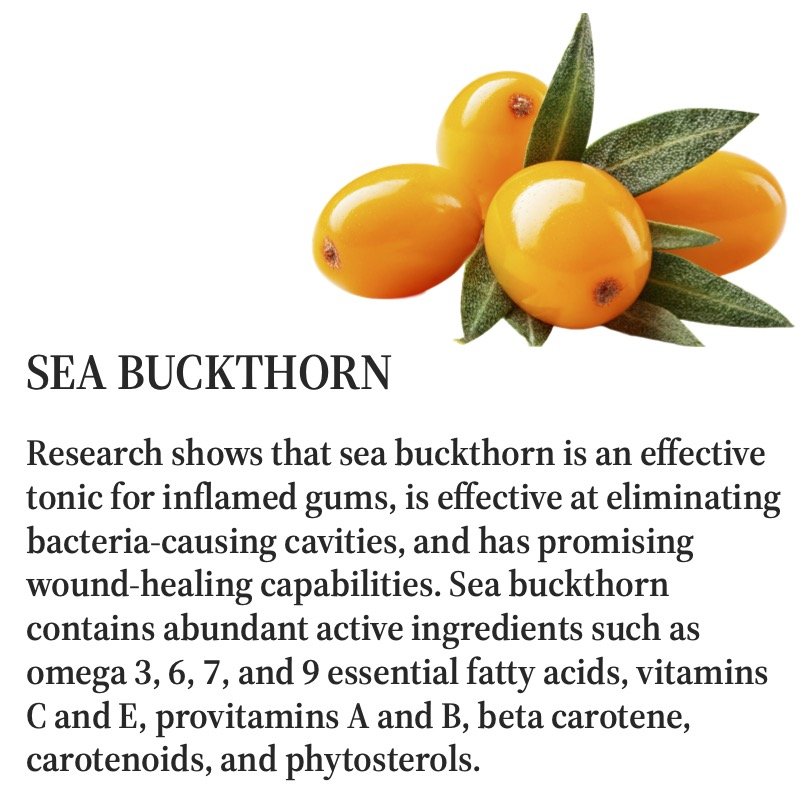Tooth and Gums Tonic: Botanical Oil 2oz
Ingredients: Fractionally Distilled Coconut (Cocos Nucifera), Sea Buckthorn (Hippophae Rhamnoides), Peppermint (Mentha Piperita L.), Sweet Orange (Citrus Sinensis), Cinnamon (Cinnamomum verum), TeaTree (Melaleuca alternifolia) *organic
Size: 2oz
Use: As a brushing oil, Apply a few drops directly inside the mouth and massage over the gums and teeth using a toothbrush.
As a mouthwash, Swish and spit
Ingredient Research: The ingredient research is for educational purposes and does not include product claims. This product does not claim to treat or cure any disease.
The tonic contains ingredients that have been shown in recent studies:
Inhibit gingivitis and the bacteria that lead to receding gums +Anti-inflammatory and antioxidants that assist in healing gums and tissue
Inhibit bacteria that cause cavities, oral infections, and bad breath
Effective at inhibiting antibiotic-resistant bacteria
Research:
Sea Buckthorn
Benefits: Research has shown that sea buckthorn is an effective mouthwash for chronic periodontitis with an anti-inflammatory for inflamed gums and is effective at eliminating bacteria-causing cavities and promising wound healing capabilities. Sea buckthorn contains anti-inflammatories for gums and overall oral health and an abundance of active ingredients such as omega 3, 6, 7, and 9 essential fatty acids, vitamin C, E, provitamins A and B, beta carotene, carotenoids phytosterols, and rare palmitoleic acids.
2019 Benefits of sea buckthorn (Hippophae rhamnoides) pulp oil-based mouthwash on oral health
2016 Role of sea buckthorn oil in the management of chronic periodontitis: follow-up study
2022 Sea buckthorn--Nature's Boon against Periodontal Pathogens: An Ex vivo Study.
2020 The bioactive components, as well as the nutritional and health effects of sea buckthorn
2022 Sea buckthorn against periodontitis: A clinical and microbiological study
2017 Abundance of active ingredients in sea-buckthorn oil
2005 A preclinical study of the effects of sea buckthorn (Hippophae rhamnoides L.) leaf extract on cutaneous wound healing in albino rats
Fractionally Distilled Coconut
Benefits: Fractionally distilled coconut oil or MTC is concentrated coconut oil that will not solidify and has antibacterial and anti-fungal properties. Fractionally distilled coconut oil is often used as a dietary supplement and allows for deeper penetration of active botanicals.
2007 In vitro antimicrobial properties of coconut oil on Candida species in Ibadan, Nigeria
2019 Dietary Supplementation with Medium-Chain Triglycerides Reduces Candida Gastrointestinal Colonization in Preterm Infants
2013 Antimicrobial effects of virgin coconut oil and its medium-chain fatty acids on Clostridium difficile
Peppermint
Benefits: A lab study published in the 2013 European Journal of Dentistry noted peppermint oil, along with four others, as an effective antimicrobial agent to kill an assortment of oral pathogens, as well as Staphylococcus, the most common bacteria associated with cavities. Recently, it was found that peppermint oil is one of the most effective agents in killing anaerobic bacteria (bacteria that thrive in a low-oxygen environment), such as the bacteria below the gum line that causes gum disease.
2019 Antibacterial and anti-biofilm activities of peppermint essential oil against Staphylococcus aureus
2010 Effects of oral care with essential oil on improvement in oral health status of hospice patients
2020 Effects of Labrador Tea, Peppermint, and Winter Savory Essential Oils on Fusobacterium nucleatum
2012 Physical and Antimicrobial Properties of Peppermint Oil Nanoemulsions
2019 Chemical constituents, in vitro antibacterial and antifungal activity of Mentha × Piperita L. (peppermint) essential oils
2015 Antibacterial and antioxidant activities of Mentha piperita L.
Sweet Orange
Benefits: Sweet orange has a pleasant taste, rich with antioxidants and anti-inflammatory properties beneficial for sensitive gums. It also has shown to be an effective antimicrobial agent used to treat infections and dress wounds
2017 Chemical composition, antimicrobial, and antioxidant activities of orange essential oil and its concentrated oils
2016 Essential oil components of orange peels and antimicrobial activity
2012 Application of orange essential oil as an anti-staphylococcal agent in a dressing model
2014 Anti-inflammatory effects of characterized orange peel extracts enriched with bioactive polymethoxyflavones
Cinnamon
Benefits: For teeth and overall oral health: Cinnamon oil is helpful in combating tooth decay because of its antibacterial properties which include mutans streptococci the leading cause of cavities and Streptococcus mutans, Streptococcus salivarius, Streptococcus sanguinis, Porfiromonas gingivalis, Prevotella intermedia, Actinobacilus actinomycetemcomitans, Enterococcus faecalis, Candida albicans and Lactobacilli which are involved in dental degradation, periodontal disease, bad breath, endodontic lesions, and other oral infections. Cinnamon has also been shown to be an effective anti-plaque agent.
For gums: Studies have shown cinnamon to have strong anti-inflammatory properties to soothe inflamed gums and inhibit the bacteria that cause gum disease.
2013 Antibacterial activity of cinnamon oil on oral pathogens
2020 Effects of Cinnamon (Cinnamomum spp.) in Dentistry: A Review
2017 Effect of cinnamon (Cinnamomum verum) bark essential oil on the halitosis-associated bacterium Solobacterium moorei and in vitro cytotoxicity
2018 Antibacterial effects of cinnamon (Cinnamomum zeylanicum) bark essential oil on Porphyromonas gingivalis
2011 Comparative study of cinnamon oil and clove oil on some oral microbiota
2017 In Vitro Anti-Cariogenic Plaque Effects of Essential Oils Extracted from Culinary Herbs
Ingredients: Fractionally Distilled Coconut (Cocos Nucifera), Sea Buckthorn (Hippophae Rhamnoides), Peppermint (Mentha Piperita L.), Sweet Orange (Citrus Sinensis), Cinnamon (Cinnamomum verum), TeaTree (Melaleuca alternifolia) *organic
Size: 2oz
Use: As a brushing oil, Apply a few drops directly inside the mouth and massage over the gums and teeth using a toothbrush.
As a mouthwash, Swish and spit
Ingredient Research: The ingredient research is for educational purposes and does not include product claims. This product does not claim to treat or cure any disease.
The tonic contains ingredients that have been shown in recent studies:
Inhibit gingivitis and the bacteria that lead to receding gums +Anti-inflammatory and antioxidants that assist in healing gums and tissue
Inhibit bacteria that cause cavities, oral infections, and bad breath
Effective at inhibiting antibiotic-resistant bacteria
Research:
Sea Buckthorn
Benefits: Research has shown that sea buckthorn is an effective mouthwash for chronic periodontitis with an anti-inflammatory for inflamed gums and is effective at eliminating bacteria-causing cavities and promising wound healing capabilities. Sea buckthorn contains anti-inflammatories for gums and overall oral health and an abundance of active ingredients such as omega 3, 6, 7, and 9 essential fatty acids, vitamin C, E, provitamins A and B, beta carotene, carotenoids phytosterols, and rare palmitoleic acids.
2019 Benefits of sea buckthorn (Hippophae rhamnoides) pulp oil-based mouthwash on oral health
2016 Role of sea buckthorn oil in the management of chronic periodontitis: follow-up study
2022 Sea buckthorn--Nature's Boon against Periodontal Pathogens: An Ex vivo Study.
2020 The bioactive components, as well as the nutritional and health effects of sea buckthorn
2022 Sea buckthorn against periodontitis: A clinical and microbiological study
2017 Abundance of active ingredients in sea-buckthorn oil
2005 A preclinical study of the effects of sea buckthorn (Hippophae rhamnoides L.) leaf extract on cutaneous wound healing in albino rats
Fractionally Distilled Coconut
Benefits: Fractionally distilled coconut oil or MTC is concentrated coconut oil that will not solidify and has antibacterial and anti-fungal properties. Fractionally distilled coconut oil is often used as a dietary supplement and allows for deeper penetration of active botanicals.
2007 In vitro antimicrobial properties of coconut oil on Candida species in Ibadan, Nigeria
2019 Dietary Supplementation with Medium-Chain Triglycerides Reduces Candida Gastrointestinal Colonization in Preterm Infants
2013 Antimicrobial effects of virgin coconut oil and its medium-chain fatty acids on Clostridium difficile
Peppermint
Benefits: A lab study published in the 2013 European Journal of Dentistry noted peppermint oil, along with four others, as an effective antimicrobial agent to kill an assortment of oral pathogens, as well as Staphylococcus, the most common bacteria associated with cavities. Recently, it was found that peppermint oil is one of the most effective agents in killing anaerobic bacteria (bacteria that thrive in a low-oxygen environment), such as the bacteria below the gum line that causes gum disease.
2019 Antibacterial and anti-biofilm activities of peppermint essential oil against Staphylococcus aureus
2010 Effects of oral care with essential oil on improvement in oral health status of hospice patients
2020 Effects of Labrador Tea, Peppermint, and Winter Savory Essential Oils on Fusobacterium nucleatum
2012 Physical and Antimicrobial Properties of Peppermint Oil Nanoemulsions
2019 Chemical constituents, in vitro antibacterial and antifungal activity of Mentha × Piperita L. (peppermint) essential oils
2015 Antibacterial and antioxidant activities of Mentha piperita L.
Sweet Orange
Benefits: Sweet orange has a pleasant taste, rich with antioxidants and anti-inflammatory properties beneficial for sensitive gums. It also has shown to be an effective antimicrobial agent used to treat infections and dress wounds
2017 Chemical composition, antimicrobial, and antioxidant activities of orange essential oil and its concentrated oils
2016 Essential oil components of orange peels and antimicrobial activity
2012 Application of orange essential oil as an anti-staphylococcal agent in a dressing model
2014 Anti-inflammatory effects of characterized orange peel extracts enriched with bioactive polymethoxyflavones
Cinnamon
Benefits: For teeth and overall oral health: Cinnamon oil is helpful in combating tooth decay because of its antibacterial properties which include mutans streptococci the leading cause of cavities and Streptococcus mutans, Streptococcus salivarius, Streptococcus sanguinis, Porfiromonas gingivalis, Prevotella intermedia, Actinobacilus actinomycetemcomitans, Enterococcus faecalis, Candida albicans and Lactobacilli which are involved in dental degradation, periodontal disease, bad breath, endodontic lesions, and other oral infections. Cinnamon has also been shown to be an effective anti-plaque agent.
For gums: Studies have shown cinnamon to have strong anti-inflammatory properties to soothe inflamed gums and inhibit the bacteria that cause gum disease.
2013 Antibacterial activity of cinnamon oil on oral pathogens
2020 Effects of Cinnamon (Cinnamomum spp.) in Dentistry: A Review
2017 Effect of cinnamon (Cinnamomum verum) bark essential oil on the halitosis-associated bacterium Solobacterium moorei and in vitro cytotoxicity
2018 Antibacterial effects of cinnamon (Cinnamomum zeylanicum) bark essential oil on Porphyromonas gingivalis
2011 Comparative study of cinnamon oil and clove oil on some oral microbiota
2017 In Vitro Anti-Cariogenic Plaque Effects of Essential Oils Extracted from Culinary Herbs
Ingredients: Fractionally Distilled Coconut (Cocos Nucifera), Sea Buckthorn (Hippophae Rhamnoides), Peppermint (Mentha Piperita L.), Sweet Orange (Citrus Sinensis), Cinnamon (Cinnamomum verum), TeaTree (Melaleuca alternifolia) *organic
Size: 2oz
Use: As a brushing oil, Apply a few drops directly inside the mouth and massage over the gums and teeth using a toothbrush.
As a mouthwash, Swish and spit
Ingredient Research: The ingredient research is for educational purposes and does not include product claims. This product does not claim to treat or cure any disease.
The tonic contains ingredients that have been shown in recent studies:
Inhibit gingivitis and the bacteria that lead to receding gums +Anti-inflammatory and antioxidants that assist in healing gums and tissue
Inhibit bacteria that cause cavities, oral infections, and bad breath
Effective at inhibiting antibiotic-resistant bacteria
Research:
Sea Buckthorn
Benefits: Research has shown that sea buckthorn is an effective mouthwash for chronic periodontitis with an anti-inflammatory for inflamed gums and is effective at eliminating bacteria-causing cavities and promising wound healing capabilities. Sea buckthorn contains anti-inflammatories for gums and overall oral health and an abundance of active ingredients such as omega 3, 6, 7, and 9 essential fatty acids, vitamin C, E, provitamins A and B, beta carotene, carotenoids phytosterols, and rare palmitoleic acids.
2019 Benefits of sea buckthorn (Hippophae rhamnoides) pulp oil-based mouthwash on oral health
2016 Role of sea buckthorn oil in the management of chronic periodontitis: follow-up study
2022 Sea buckthorn--Nature's Boon against Periodontal Pathogens: An Ex vivo Study.
2020 The bioactive components, as well as the nutritional and health effects of sea buckthorn
2022 Sea buckthorn against periodontitis: A clinical and microbiological study
2017 Abundance of active ingredients in sea-buckthorn oil
2005 A preclinical study of the effects of sea buckthorn (Hippophae rhamnoides L.) leaf extract on cutaneous wound healing in albino rats
Fractionally Distilled Coconut
Benefits: Fractionally distilled coconut oil or MTC is concentrated coconut oil that will not solidify and has antibacterial and anti-fungal properties. Fractionally distilled coconut oil is often used as a dietary supplement and allows for deeper penetration of active botanicals.
2007 In vitro antimicrobial properties of coconut oil on Candida species in Ibadan, Nigeria
2019 Dietary Supplementation with Medium-Chain Triglycerides Reduces Candida Gastrointestinal Colonization in Preterm Infants
2013 Antimicrobial effects of virgin coconut oil and its medium-chain fatty acids on Clostridium difficile
Peppermint
Benefits: A lab study published in the 2013 European Journal of Dentistry noted peppermint oil, along with four others, as an effective antimicrobial agent to kill an assortment of oral pathogens, as well as Staphylococcus, the most common bacteria associated with cavities. Recently, it was found that peppermint oil is one of the most effective agents in killing anaerobic bacteria (bacteria that thrive in a low-oxygen environment), such as the bacteria below the gum line that causes gum disease.
2019 Antibacterial and anti-biofilm activities of peppermint essential oil against Staphylococcus aureus
2010 Effects of oral care with essential oil on improvement in oral health status of hospice patients
2020 Effects of Labrador Tea, Peppermint, and Winter Savory Essential Oils on Fusobacterium nucleatum
2012 Physical and Antimicrobial Properties of Peppermint Oil Nanoemulsions
2019 Chemical constituents, in vitro antibacterial and antifungal activity of Mentha × Piperita L. (peppermint) essential oils
2015 Antibacterial and antioxidant activities of Mentha piperita L.
Sweet Orange
Benefits: Sweet orange has a pleasant taste, rich with antioxidants and anti-inflammatory properties beneficial for sensitive gums. It also has shown to be an effective antimicrobial agent used to treat infections and dress wounds
2017 Chemical composition, antimicrobial, and antioxidant activities of orange essential oil and its concentrated oils
2016 Essential oil components of orange peels and antimicrobial activity
2012 Application of orange essential oil as an anti-staphylococcal agent in a dressing model
2014 Anti-inflammatory effects of characterized orange peel extracts enriched with bioactive polymethoxyflavones
Cinnamon
Benefits: For teeth and overall oral health: Cinnamon oil is helpful in combating tooth decay because of its antibacterial properties which include mutans streptococci the leading cause of cavities and Streptococcus mutans, Streptococcus salivarius, Streptococcus sanguinis, Porfiromonas gingivalis, Prevotella intermedia, Actinobacilus actinomycetemcomitans, Enterococcus faecalis, Candida albicans and Lactobacilli which are involved in dental degradation, periodontal disease, bad breath, endodontic lesions, and other oral infections. Cinnamon has also been shown to be an effective anti-plaque agent.
For gums: Studies have shown cinnamon to have strong anti-inflammatory properties to soothe inflamed gums and inhibit the bacteria that cause gum disease.
2013 Antibacterial activity of cinnamon oil on oral pathogens
2020 Effects of Cinnamon (Cinnamomum spp.) in Dentistry: A Review
2017 Effect of cinnamon (Cinnamomum verum) bark essential oil on the halitosis-associated bacterium Solobacterium moorei and in vitro cytotoxicity
2018 Antibacterial effects of cinnamon (Cinnamomum zeylanicum) bark essential oil on Porphyromonas gingivalis
2011 Comparative study of cinnamon oil and clove oil on some oral microbiota
2017 In Vitro Anti-Cariogenic Plaque Effects of Essential Oils Extracted from Culinary Herbs








